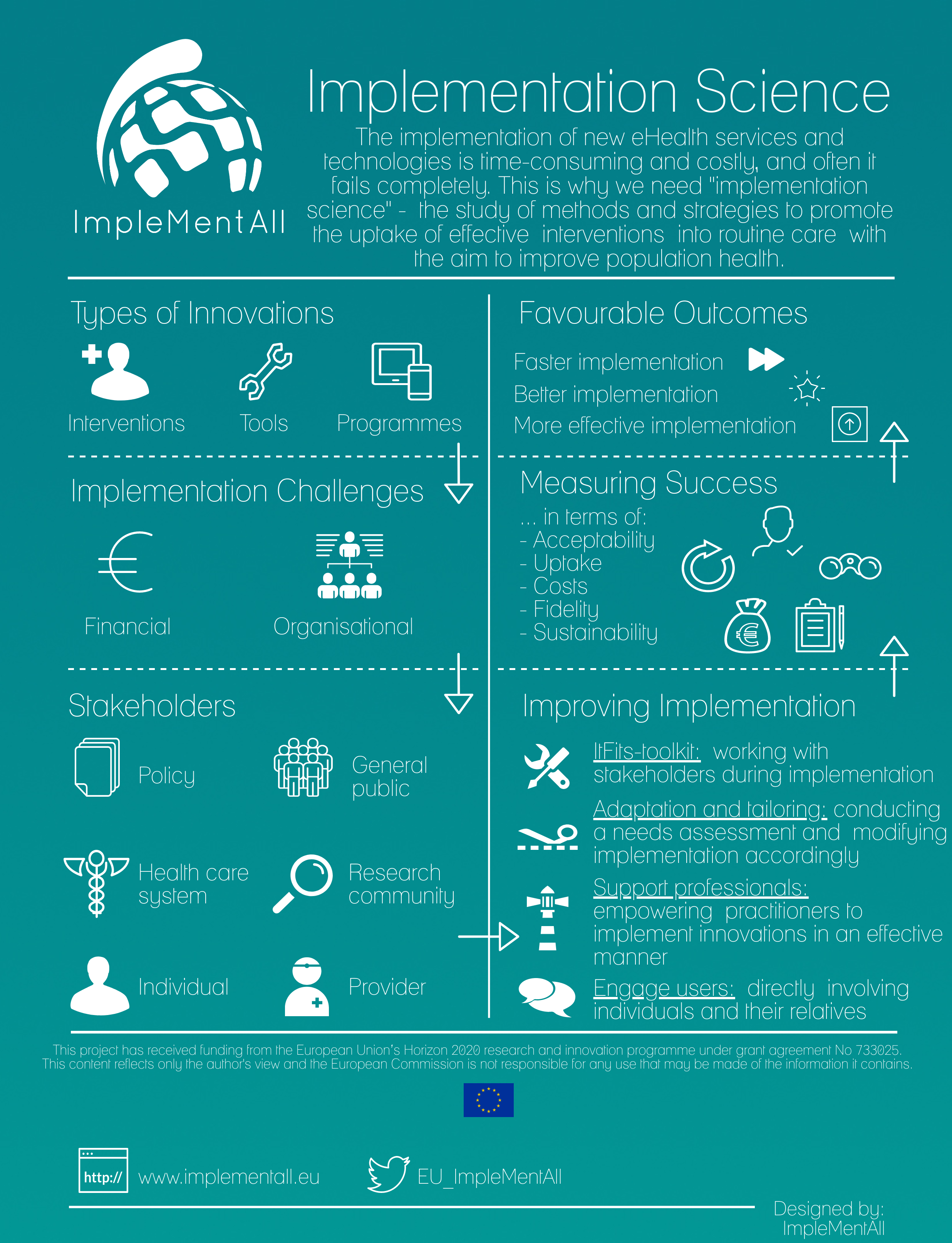Blog
Demystifying implementation science
Thu. 12. Dec 2019 14:18
We talk a lot about implementation science, because it is at the core of the ImpleMentAll project. But, what is implementation science, why is it important to study, who are the stakeholders, and which outcomes do we predict will come from this line of studying? In this blog post, we will demystify implementation science from an ImpleMentAll perspective, so you can understand the scientific field as well as IMA a little better.
When explaining implementation science, we will focus on six important factors; Types of innovations, Challenges, Stakeholders, Improvements, Measurements, and Outcomes. Combined, these six factors can explain the journey of an innovation from development to complete implementation. That is, the entire implementation process and the primary aspects of implementation science.
Types of innovations
In IMA, we have divided the most common innovations implemented in healthcare into three types; interventions, tools, and internet-based programmes. First, interventions are essentially program elements combined in order to produce behaviour change to improve an individual’s health status. Second, tools are physical objects that can be used in the healthcare sector to improve their services. Third, internet-based programmes are virtual tools that are used in the healthcare sector to improve the offered services. In IMA, we have designed an internet-based programme, the ItFits-toolkit, to help clinicians implement innovations more smoothly and efficiently.
Challenges
There are a number of challenges, which implementation science seeks to overcome. One is the challenge of costs, because the healthcare sectors of most countries are funded either partly or entirely by the state, and, thus, cannot exceed their budgets. Therefore, spending vast sums on an innovation only to fail at the implementation stage, keeps many healthcare providers from innovating at a large scale. If implementation science can improve the likelihood of successful implementation, this challenge could possibly be diminished. Another implementation challenge is an organisational one. It requires great organisational skills to succeed with implementing an innovation into routine practice, and for it to stay as such. These two challenges are exactly what we are trying to solve in IMA. By creating the ItFits-toolkit, we might be able to make implementation less expensive and raise the chance of success. Furthermore, the toolkit offers support in some of the organisational tasks, reducing the challenges for healthcare professionals.
Stakeholders
Stakeholders of implementation science include policy makers, because policies affect which innovations can be implemented and to which degree. The healthcare system is also included, because it has the possibility of being reformed by an innovation if it is implemented successfully. The individual persons in the healthcare system, i.e. the patients, are also stakeholders of implementation science, as they are the ones affected by the how and when of the implementation process. This also goes for the healthcare providers and staff, as they are the ones to actually do the implementation. Lastly, the community counts as two stakeholders; the research community and the general public.
Improvements
Actions taken to improve implementation can be described as four primary initiatives. The first one is interactive assistance where the implementation scientist or the developer of the innovation works actively with the stakeholders during implementation to ensure that it is successful. The second initiative is adaptation and tailoring, where a needs assessment should be conducted in order to modify the implementation accordingly. The third initiative is support for professionals, because practitioners and clinicians should be empowered to implement innovations in the most effective manner. The fourth and final initiative for improving implementation is to engage the end users of new services by directly involving the individual patients and their relatives.
Measurements
The success of implementation is often measured in terms of five aspects: how well the implicated parties accept the innovation; how much the stakeholders make use of the innovation, i.e. uptake; how much it costs to implement the innovation; if the healthcare providers are devoted to make the innovation part of the daily routines; and if the innovation provides a viable and feasible solution for the healthcare providers to use.
Outcomes
In IMA, we are conducting implementation research in order to find ways to improve three outcomes that could potentially improve healthcare across Europe. By working towards faster, better, and more effective implementation of innovations, the healthcare sector can save time and money, while the innovations can fulfil their purpose sooner. Therefore, the main point of developing the ItFits-toolkit is to improve the services provided by the healthcare sector.
“ImpleMentAll brings together researchers from different academic fields, who all share a common goal: making evidence-based healthcare available to those in need. Technology can be a great way to treat those people, but there is a big ‘research-to-practice gap’. Implementation Science can help us find ways to foster the integration of new interventions into different healthcare contexts,” says Anne Etzelmueller, leader of WP5 – Implementation management and knowledge transfer.
We hope this gave you a more profound insight into the field of implementation science and thereby the purpose of IMA. If you have any questions or just want to share your thoughts, please feel free to add a comment below!

